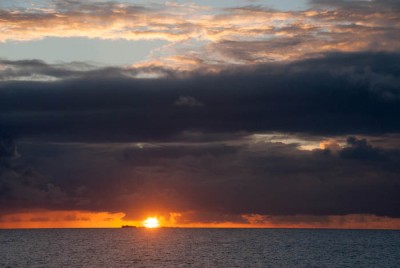Sailing at Night
01 September 2013

By now we have accumulated considerable experience sailing after dark. The daylight passes quickly by and before you know it the sun is setting. As we chase the sun west we prepare for night. Several actions usually occur before dark but when we have had a technical failure sometimes our routine is thrown amuck. When it does some of the chores in the dark are harder to do and take more time. Normally we eat dinner in the late afternoon as it is easier to prepare and I don't like a full stomach when I go to sleep.
The first action is to decide on what the sail set and configuration should be. By late afternoon I have usually downloaded by single sideband radio our email including grib weather files so we have a pretty good idea if the current weather is expected to continue. We need to look at the sky and guess whether we'll be at risk for squalls. Squalls come with large amount of rain, sometimes bolts of lightning and frequently with winds up to 40 knots or even more. They are quite intimidating especially at night! You need to anticipate these winds and shorten sail before they hit you or you risk blowing your sails out from the violent flogging. It's normally smart to reef at night automatically because you may have less lead-time to shorten sail ahead of a squall. You can use the radar to detect rain but it consumes a great amount of electricity so we don't leave it on. We may decide to douse the spinnaker and deploy our headsail(s) with poles out to stabilize the sails which helps reduce flogging from light airs and a swell. This usually would take about 45 minutes so we have to get that done early.
Now it gets colder at night even in the tropics so I usually put on long underwear to stay warm. We run the generator at 1600 hours before dark and then as it gets dusk on go the navigation lights and instrument lights. We now get our gear lined up. Usually our harnesses and life preservers are in the main cabin easily accessible. We have LED headlights that are very useful that we bring into the cockpit at night. Finally I'll close off some of the cockpit vinyl side-curtains to stay out of the wind.
Nancy usually has finished the dishes and stays below either resting, reading or napping. I usually take the first night watch. This is when the mind games start! It's easy to imagine what disasters could occur when it is pitch-black and you can't see ahead of the boat. I love sailing at night with a full or near full moon as it is beautiful and you have enough light to see ahead but as the time of month passes the moonrise occurs later and later so a half moon doesn't rise until maybe midnight and until that time it's BLACK. I really dislike sailing at night without any moon. Now the stars do lighten the sky to some degree but only if the cloud coverage is limited. The worst nights are when the sky is overcast and threatening. You can't see and you don't know what the weather is going to do.
The mind games start when it gets black. My greatest fear at night is sailing into a submerged container that was lost at sea and for some reason didn't sink. We would take on water so fast that we might have as little as 4 minutes to abandon ship. Whales also sometime attack boats and sink them. Even more common equipment failures are harder to handle at night and of course one is usually quite tired.
Sleeping on watch is something of a new experience for me. It used to be that you would have to stay awake and do a 360 degree inspection of the horizon every 12 minutes. The advent of AIS, which electronically warns you and large commercial vessels of potential closing situations has allowed for longer intervals between checking the horizon so we can nap and that sure makes night watches less difficult. Also there is so little traffic in the Pacific that you very rarely have company. On our last 6 day long passage we saw only two boats near the end of the trip.
Nancy relieves me at around 2200 and depending on who is the most in need of sleep, she may sleep later or not. I will get up sometime around 2 to 4 am or sooner if she needs help with the sails or navigation. As soon as I'm up and the problem is solved she goes down for the count and I either nap or listen to an audiobook or music until she awakes after dawn. The sails are reset and the new day then begins.
From the crew of Always Saturday



Comments